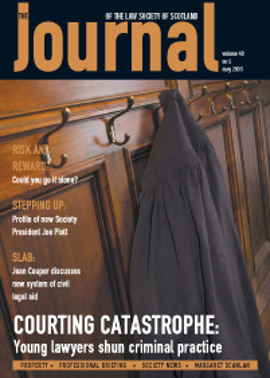Client relations
Using conciliation to improve client care
Last year the Client Relations Office received more letters from the public than ever before. In most instances the letters were expressing concern or dissatisfaction with the service that the client had received from their solicitor.
Most clients write to the Society without realising that they can raise their concerns direct with the firm. The majority of complaints are service-based and relatively straightforward. The most common causes of concern and complaints concern communication and delay.
Since the mid 1990s, the Client Relations Office has encouraged firms to use conciliation and the Client Relations Partner system to resolve client concerns. Many firms use these systems very successfully and there is an increasing recognition of the benefits of resolving concerns in this way.
Improving client care
The best way to handle client concerns or dis-satisfaction is to have an internal system for spotting and dealing with those issues at an early stage. The firm’s client Relations Partner is key to the success of this kind of system. Last year the Journal published a suggested protocol for dealing with client concerns outlined by the Client Care Committee. Either the protocol or the template in the Better Client Care Guidance Manual is a good starting point for any system.
The system only works if all members of staff in a firm are aware of it and know who the Client Relations Partner is. Often the first sign of a client’s concern may be handled by a member of the firm’s support staff.
It is also worthwhile for a firm to keep a record of concerns expressed and how they were resolved. Often resolving dissatisfaction can be a learning experience for a firm and can highlight shortcomings that could be addressed by staff training.
Telling the client
Clearly, talking about complaints (or “the ‘c’ word”, as one solicitor called it in a recent roadshow) is not a positive start to the solicitor /client relationship, but talking about the firm’s focus on client care can be a positive way of explaining the system. A good way of making the client aware of the complaints procedure is through a Terms of Business letter at the outset of dealings. There is evidence to show that a positive approach to dealing with client concerns or dissatisfaction maintains and often improves the solicitor/client relationship.
The qualities of the client relations partner
Appointing the right Client Relations Partner is paramount to good client care. The Society uses the term ‘partner’, as most firms appoint a partner to the role, but the person appointed can be a consultant, an associate, a senior assistant or even a non solicitor. The key is that the person is empowered to offer solutions to the benefit of the client and the firm.
The key qualities for a Client Relations Partner tend to be:
- A good listener
Sometimes clients just want to vent their frustration about the way the law works or something the firm has done. For the Client Relations Partner that means being able to listen to their point of view, acknowledge it and possibly empathise.
- A positive attitude
In many cases of client concern, the client wants to look back and apportion blame. The role of the Client Relations Partner is to look ahead with the client rather than back and find a solution which puts the relationship back on track.
- A good problem solver
If a client is unsatisfied, the Client Relations Partner needs to try to identify what is needed to resolve the concerns. Solutions can range from an early apology, to a reduction of fees or simply agreeing a communication plan for the future or a timetable for completion of work.
- Someone with the time and the commitment to see the conciliation through
Conciliation can fall down at the final hurdle and it is very important to see the system through to its conclusion. Sometimes, problems arise because the Client Relations Partner is not empowered to see the agreement through or has insufficient time for their client care duties. In those circumstances, the client’s dissatisfaction can be significantly increased and a full complaint to the Society is the usual result.
In this issue
- Scotland's courts face lost generation catastrophe
- Compromise is better option to confrontation
- Date set for reform package
- Risk and reward await those who go on their own
- A matter of opinion
- Organise workload to make your valuable time count
- Continuity planning takes drama out of a crisis
- Pursuers panel advises on professional negligence
- Client relations
- Platt aiming to push forward
- President's column
- Abandonment at common law still competent
- Holiday heaven or hell?
- Data Protection Act 1998 - what you need to know
- Getting to grips with debt
- Europe
- How the leopard changed its spots
- Licensing
- Scottish Solicitors' Discipline Tribunal
- Scottish Solicitors' Discipline Tribunal (1)
- Scottish Solicitors' Discipline Tribunal (2)
- Website reviews
- Book reviews
- Contaminated land must be discussed with clients
- Property reports service now online






